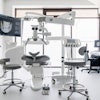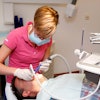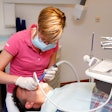
Many nursing home residents often have poor oral health, which can also negatively affect their overall physical and psychological health. Therefore, a team of researchers searched the scientific literature to find which strategies resulted in healthier teeth and gums for the nursing home population.
The authors summarized three key findings in a new systematic review published in PLOS One (June 13, 2017). They also noted the lack of quality studies on the topic and called for more researchers to investigate improving oral health in nursing homes.
“Poor oral health has been a persistent problem in nursing home residents for decades.”
"Poor oral health has been a persistent problem in nursing home residents for decades, with severe consequences for residents and the healthcare system," wrote the authors, led by Matthias Hoben, PhD, from the University of Alberta in Canada. "Potentially promising strategies are available. ... However, studies, assessing these strategies have a high risk for bias."
Dental problems are prevalent among the nursing home population, and oral healthcare can be difficult for residents, who often have physical and cognitive limitations, including dementia. Yet many nursing home staff are not educated about how to provide oral healthcare for this population. The authors, therefore, reviewed the scientific literature to find strategies that have successfully helped residents take care of their own dental health or helped staff overcome challenges related to oral healthcare for those with dementia.
The authors searched scientific databases for related studies published at any time period or in any language. However, they ended up with only four unique studies that were referenced in seven total sources. The studies evaluated various strategies to improve oral health among nursing home residents, including the following ways:
- Changing the physical environment, such as through visual clues
- Training staff
- Providing physical assistance
While not enough studies were available to provide recommendations, the authors did summarize three main findings. Below are the key takeaways.
1. Train staff
Untrained staff provide about 80% of direct oral healthcare for nursing home residents, according to the review. Furthermore, oral health tends to be viewed as a lower priority than other healthcare needs, and facilities may not have oral health protocols in place.
The highest-quality study included in the review found that educating staff had a significant impact on residents' oral health. In the study, simply training staff led to increased knowledge about dental health and also to improved oral health scores for the residents, suggesting that staff education may be a crucial component of improving oral health for nursing home residents.
2. Be friendly
Many nursing home patients cannot take care of their own dentition, and those who can may need assistance from staff. Multiple studies found friendly verbal and nonverbal cues from staff appeared to have a positive effect on residents with Alzheimer's disease.
Specifically, one study found that encouraging comments and demonstrating a task were significantly correlated with a resident completing a higher percentage of oral health tasks. Greetings, compliments, smiling, and providing a gentle, guiding touch also appeared to generate positive behavioral changes.
3. Overcome responsive behavior
Dementia is a common condition among nursing home residents, with studies estimating that between 50% and 75% of nursing home residents have dementia. Nursing home staff report that responsive behaviors from residents with dementia, such as resisting care through physical or verbal actions, are a major barrier to providing oral healthcare for the nursing home population.
One study found that when an intervention was used to improve residents' responsive behaviors, their oral health also significantly improved. The review authors, however, cautioned that more research is needed to confirm this finding, because the study was only a pilot study with a small sample size.
Why aren't there more studies?
Although oral health is a significant factor for improving nursing home residents' quality of life, it appears to be a neglected topic of study among the research community. Even the seven sources included in this review did not describe the interventions or findings in sufficient detail, the authors noted.
"We found a paucity of evidence related to our research question," the authors wrote. "Only four research projects assessed the effectiveness of strategies of interest to this review, none of them was a randomized trial, and methodological quality was low or low moderate."
The authors also noted that there are a number of studies on healthcare for the nursing home population, including how to overcome responsive behaviors, but almost none relate specifically to oral healthcare. As a result, they issued a call to action, hoping dental researchers will look further into caring for the nursing home population.
"Specific tailoring of these strategies to the populations of nursing home residents and care providers and rigorous effectiveness studies are needed," the authors concluded. "Without practical strategies that are robustly assessed, care providers will keep struggling with providing proper oral care to nursing home residents, and oral health of nursing home residents will remain a major issue -- with severe consequences to residents' general health and quality of life, as well as the healthcare system."



















